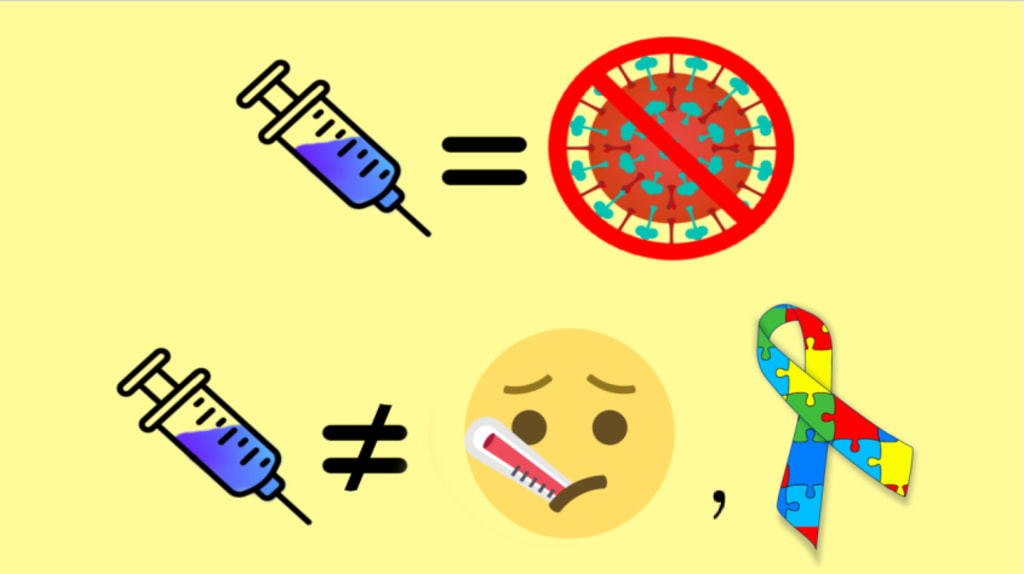
"Vaccinations will give your children autism."
"Vaccinations will make you sick."
"Vaccinations are not as good as natural immune systems."
"Vaccinations are not necessary because infection rates are already so low."
These are things that many people believe even though there is scientific proof that these claims are false. Because people believe these claims, many chooses not to vaccinate their children, which not only puts their children at risk, but anyone they come in contact with. Some are concerned about potential injury from vaccinations, but very few ever occur. Most schools require vaccinations anyway except under certain circumstances, so is it not best to give your child the best chance at life you can?
There are many false claims when it comes to the negative effects of vaccinations. For example, vaccinations give children autism. Many have made connections with the increase of diagnoses with the increase of vaccinations, and while there is a positive correlation, it is not one of cause and effect. One reason diagnoses have gone up is that the set guidelines for autism diagnoses have changed. The Diagnostic and Statistical Manual of Mental Disorders, 4th Edition came out in 1994 and included a whole new set of guidelines. Previously, it was much more difficult to be diagnosed and there was no way to diagnose milder forms. Now we know it is not you have it or you do not, it is more of a spectrum. So after 1994, it was not that more people had autism than before, it was just that it was easier for those who had it to be diagnosed. There is a preservative in some vaccines called thimerosal which breaks down into, among other things, mercury. Obviously mercury is bad in large quantities, but the amount in vaccines is inconsequential. Because infants start showing signs of autism after vaccines, naturally people thought it was because of the vaccines, but the fact of the matter is that the child is too young to show signs before or at the time of the vaccine, but they still have the disorder, vaccine or not. The original study “proving” vaccines cause autism has since been discredited due to procedural error, conflict of interest, and ethical violations.
When a child is not vaccinated it puts them at risk for a preventable disease, but not only that, it also puts those around them at risk. If an unvaccinated child contracts a disease such as whooping cough, they can spread the disease. Even if the people they are in direct contact with show no signs of disease themselves, those people can still be carriers and pass it on to babies, the elderly, or anyone else with a weakened immune system who will have a higher chance of dying from it. Even if someone has been vaccinated, if their immune system has been weakened due to say chemotherapy treatments, they may still contract the disease. Some are concerned that the vaccine itself will make the child sick with the disease it is attempting to prevent and is not worth the risk. However, the first, last, and only vaccine to cause the disease it was attempting to prevent was the oral polio vaccine which is no longer administered. What a vaccine does, is it puts a small dose of a dead or modified form of the virus that cannot reproduce in the body so that it can recognize the virus faster and make antibodies so that in the event the body becomes exposed to the virus again, it has an easier time fighting off the disease and decreases risk of death. While there can be carriers, a child that has contracted a preventable disease because they have not been vaccinated could potentially start an epidemic such as a whooping cough epidemic that took the lives of infants too young to have received the vaccine and other resurfacings of diseases that had been eradicated from humans.
The most common real injury from vaccinations is shoulder injury from a needle being placed too high, but it has to do with how it is administered, not the vaccine itself. If the person administering the vaccine is not level with the person receiving it, there is a greater chance of the needle being too high and hitting one of the nerves near the shoulder. However, this is an error from the physician and has nothing to do with vaccinations, as other things require injections.
Vaccinations are required to attend public schools in all 50 states. Some private institutions offer waivers based on beliefs and some public schools offer waivers based on medical issues which is fine as long as a large majority is vaccinated which results in herd immunity so the virus has trouble spreading. When say a fourth or more of students are not vaccinated, it could start being a problem. Certain schools that are seeing their waiver percentages go up at alarming rates are no longer allowing belief based waivers in order to protect the students and staff. This means that a student would no longer be able to go to school unvaccinated because of personal or religious beliefs. One major problem some people have is that some vaccines are created using aborted fetal tissue which they are opposed to. Once again though, this is fine as long as the rest of the population remains with a large majority of vaccinated children.
The most common accusation pointed at vaccinations is that they cause autism, which can be shown as clearly not true if one only takes the time to do a basic google search. Another is that they are not worth the risk, but vaccinations are not even remotely close to being as dangerous as some people make them out to be, and definitely do not cause lasting damage in any way, shape, or form ever. The only cases of temporary damage are caused by administrator error, not vaccines themselves. Vaccines can create a sort of herd immunity, but if too many unvaccinated people are living or interacting close to each other, it can cause outbreaks which could result in many deaths of those too young to be vaccinated and those with weakened immune systems. A child cannot enter public school or most private schools without them anyway, so really, why should you not vaccinate your child?





Comments
There are no comments for this story
Be the first to respond and start the conversation.